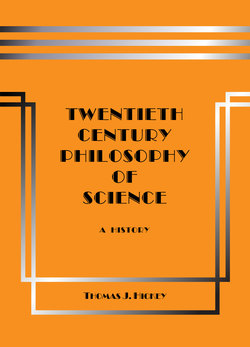Читать книгу Twentieth-Century Philosophy of Science: A History (Third Edition) - Thomas J. Hickey - Страница 109
На сайте Литреса книга снята с продажи.
Mach’s Phenomenalism
ОглавлениеErnst Mach (1838-1916) is a representative figure of the early positivist philosophy of science in physics at the turn of the twentieth century. He earned a doctorate in physics from the University of Vienna in 1860, taught experimental physics for most of his career at the University of Prague (1867-1895), and then held the chair of Inductive Philosophy at the University of Vienna (1895-1901). He was several times nominated for the Nobel Prize. He set himself the philosophical task of implementing the phenomenalist philosophy of David Hume in physics while Newtonian mechanics still prevailed in physics.
Prior to contemporary pragmatism philosophers based their philosophies of science on one or another metaphysical viewpoint. Though positivists philosophers including Mach were explicitly “antimetaphysical” (Mach even denied that he was a philosopher), they were actually advocating their own metaphysics while labeling the views they opposed as “metaphysical”, and used the term pejoratively. Positivism is a philosophy that evolved in reaction against the various romantic philosophies, and what the positivists meant by “metaphysics” was the metaphysics of the romantics. Just as the views of the romantics evolved from the philosophical tradition of the rationalists, similarly those of the positivists evolved from the tradition of the empiricists. Thus Mach’s epistemology is very similar to the views of the empiricists Berkeley and Hume, and he explicitly expressed indebtedness to them in his works.
Mach’s principal work setting forth his phenomenalist philosophy is his Analysis of Sensations (1885), which went through five editions in both German and English, although Mach also discussed his epistemological views in many of his other works. His epistemology postulates “elements” such as individual sounds, temperatures, pressures, spaces, times, and colors. When these elements are considered in relation to one another, they are studied by the physical sciences, and when they are considered in relation to the human mind or rather the nervous system of the human body, they are called “sensations” and are studied by psychology.
One of the central theses of Mach’s Analysis of Sensations is that the only difference between elements and sensations is the aspect under which they are viewed, and that physics and psychology therefore have the same subject matter. The distinction between the physical and the psychical is entirely a matter of convenience or practicality, because everything is merely a function of these elements. Everything other than these elements is a mental construct consisting of complexes of sensations. All material things including our own bodies and even the ego are nothing but complexes of elements that are constructs made by the human mind and that have some fixedness or constancy in sense experience.
A fundamental thesis of Mach’s philosophy is that material bodies do not produce sensations, but rather complexes of sensations are associated together by the human mind to produce material bodies. Ultimately all that is valuable in science is the discovery of functional relations of dependency of sensations upon one another. The constancies that enable our mental construction of physical bodies have no privileged reality status. This is even more so with such mental constructs as the physicists’ molecules and atoms, which are mental constructs that unlike those of physical bodies are not found in experience. The positivist phenomenalist philosophy is a nonrealist metaphysics, and if it is generously said to have an ontology, the ontology consists merely of the phenomenal elements/sensations.
